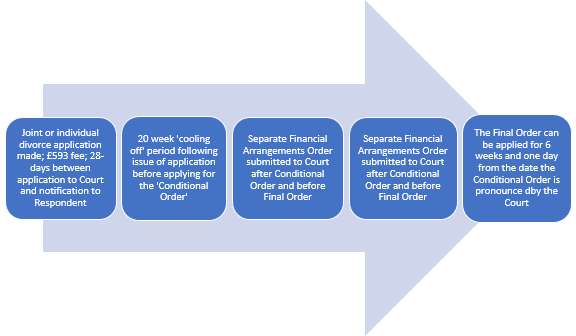No-Fault divorce – One year on
Summary
6 April 2022 saw the introduction of the long awaited ‘no-fault’ divorce. Resolution (a community of family justice professionals who work with families and individuals to resolve issues in a constructive and non-confrontational way) had campaigned for years for a change to divorce law to remove the need to lay blame on a particular person for the breakdown of a marriage. The new law aims to reduce the acrimony involved in divorce proceedings, speed the process up and reduce costs for divorcing couples. But has it been a success in its first year?
Since the introduction of ‘no-fault’ divorce a year ago, we have seen a huge jump in the number of divorce cases being issued. April 2022 saw nearly double the number of applications than in the same month in 2021. But are all these people saving money and staying friends?
First, let’s remind ourselves of the new ‘no-fault’ divorce process :

In a relatively straight-forward divorce, in which the couple can work out a division of their finances and any arrangements for the children amicably, the process from ‘start’ (issue of the application) to ‘finish’ (Final Order) should take a minimum of 6 months. In reality, the process can take up to 8 months due to the time between application for a Conditional Order and the pronouncement of the Order by the court. With such a lengthy timescale, the new regime may not have been as successful in eradicating acrimony, reducing costs and speeding up the timescales as was hoped.
There are a number of potential pitfalls which are not initially obvious. The process above assumes both parties fully co-operate. Some of the common issues that arise are:
1. Costs
The changes to the law were intended to make the divorce process cheaper. In reality, the Court fee remains at a whopping £593. Although the time spent on dealing with the application means that most solicitors have been able to reduced their ‘set’ fees, the fact that applications can be issued online at any time of the day or night, means that far more people are now issuing divorce applications themselves. However, the strict timescale for acknowledging the application means an increase in separate applications to ensure service can be proved, or to extend the time allowed for serving the application. Needless to say, this incurs fees. We strongly recommend that any party submitting a divorce application checks the form has been completed, submitted, issued and served correctly when it is first sent to the Court.
Additionally, the Applicant can no longer apply for the costs to be paid by or shared with the other party. The Court will expect the Applicant to pay for the fees. The parties can agree how this is shared, but the Applicant needs to be prepared to foot the bill if the Respondent will not agree to pay upfront. It is important to note that costs can be claimed in limited cases, in particular where the Respondent has been uncooperative, but the process for claiming these can be complicated.
2. Timescales
The Final Order of divorce cannot be applied for until after 6 weeks and a day from when the Conditional Order is made. The Conditional Order cannot be applied for until 20 weeks after the Divorce Application is issued. In theory, the total application should take 6 months to complete. However, we are finding that the process can take much longer due to delays with the Court system:
- The Courts have typically been taking up to 28 days to issue and serve the application on the other party.
- In most cases, the Court will send the Divorce Application to the Respondent both by email and in the post. But what if you do not have both? It is still necessary to prove the Respondent has received the Application. Not an issue if they have acknowledged receipt to the Court. However, if they have not received it, or you do not have the postal address, you may have to arrange personal service or get the Court’s permission to serve in another way. There are strict timescales which apply to this and it may be necessary to make a separate application to the Court for deemed or substituted service, or to extend the time for the Divorce Application to be served. Failure to do this may result in your application being dismissed, in which case you would have to start again and pay a further £593.00.
- Upon applying for the Conditional Order, the Court is taking up to 2 weeks to allocate a date for the Order to be ‘pronounced’ on a date up to 28 days from when the notice is issued.
- If further applications are made within the proceedings (eg in relation to service or costs) the Court can take a few weeks to deal with them. Paperwork is not easy to load on to the Court portal, and it is difficult to add a solicitor to the process.
- Applications for approval of a Financial order cannot be made until after the Conditional Order has been granted. Even if the parties agree to settle their finances early on, this cannot be finalised for up to 6 months after the divorce application has been issued. This could leave some parties at risk, if circumstances change, one dies or changes their mind. In addition, failure to deal with finances at an early stage can result in the divorce being delayed while this is sorted out.
3. Finances
Most importantly, the divorce process itself does not address issues such as the division of finances or what arrangements there will be for children. The law and procedure in this regard has not changed with the new divorce law and must be dealt with separately from the actual divorce process.
Obtaining the Final Order of divorce does not itself resolve any financial matters. This will require separate negotiations and , if necessary, an application to the Court for a Financial Remedy Order. In other words, a couple could be divorced but still have unresolved financial arrangements to deal with. It is open to either spouse to make an application to deal with finances in the future. The only legal bar to making a claim is if the person applying for a financial remedy order has remarried. In those cases, not all claims are debarred, including claims on pensions, and if the assets are not dealt with and recorded in a Court Order, if parties’ circumstances have changed for the better, they could find themselves worse off, or the remedies they could seek may be more expensive to pursue.
Even if both parties have come to an agreement about the division of financial assets, this must be approved by the Court to make it binding on them. It is submitted as a Financial Consent Order which must be accompanied by a form detailing of their assets, income and other circumstances. The Court will not ‘rubber stamp’ the agreement, so it is important that the paperwork is properly completed and the agreement is ‘fair’.
4. Children
The Court’s approach to resolving issues of Child Arrangements remains the same. All decisions should be made in the best interests of the children, and we would encourage parents to agree these between them. However, if you feel you need support in navigating these arrangements and how to make the best decisions for your children, or if you are concerned about what arrangements would be appropriate, we can help.
So, what is our view – ‘one year on’?
Whilst there has been a considerable rise in the number of divorce applications, this has added to the considerable frustration at delays, and generally divorces are taking longer to complete than under the ‘old’ system. The process is simpler as there is no need to ‘blame’ the other party for the divorce. However, there has also been a much bigger rise in DIY divorces where the parties have not had the benefit of early advice from a specialised family solicitor. We expect to see a big increase in people wanting advice post-divorce about finances and children issues. In some cases, it may be too late to get a fair settlement for them. This applies particularly in respect of pensions and property and many people could be losing out if they have not taken early advice about what they are entitled to and what options are open to them.
Pensions Minister Steve Webb and family law barrister Rhys Taylor, who early last year published a joint paper warning of the pitfalls of the new law, said that financial orders are only made in around one in three divorces, and not all of these orders cover pensions. They add that research indicates divorced women in particular often end up with very low pensions in retirement and are concerned the new process could make matters worse.
While, in theory, the process is ‘easier’ and avoids one party blaming the other, it is really important to avoid any false sense of security, especially when it comes to sorting out the finances. Getting this right from the outset is a serious undertaking and there will be huge repercussions if the settlement is not thought through. We strongly advise people to take professional advice.
We have seen a rise in ‘later in life’ and ‘second marriage ’ couples applying for a no-fault divorce. According to the Office for National Statistics, the number of over 65s marrying has risen by 46% in the last decade. Whilst divorce, generally, has been on the decline over that period, the number of so-called ‘Silver Separators’ has been on the increase. Whether the couple has stayed together until the children have grown up, or they have come into a marriage later in life with greater differences than they realised, a ‘no blame’ environment is opening up new futures for them. However, it is especially important that they sort out their finances properly, as there can be big differences in their incomes and needs, particularly their pensions, and it is important that their current and future financial positions post-divorce are properly considered.
How can we help?
We act as a vital form of support during a divorce. We are a three-strong Family law team who work with clients day in/day out through often the most stressful and difficult decisions they have to make in their lives. We are specialists whom you can turn to with questions about the process and for advice on the best way forward. We can assist you with any initial or additional applications required and ensure that all the paperwork is correct from the very beginning to reduce any delays and additional costs.
We are members of Resolution and we are committed to finding practical and sensible ways to reaching a settlement that is right for you and navigating the divorce process in the least confrontational and most cost-effective way. We can help you to access the other support and advice you need, from trusted professionals such as valuers and financial advisers and we will work with other professionals and colleagues to ensure, so far as possible, that your needs are met and future protected.
With the rise in ‘Silver Separators’, we would encourage parties to consider Pre-Nuptial Agreements and Cohabitation agreements, where appropriate and sensible to do so, so any future separation is as ‘painless’ as possible. Our next article will focus on ‘pre-nups’ and their advantages and disadvantages.
For further information on any topics covered in this article, please contact Lucy Clarke, Solicitor.
